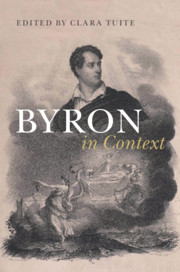Book contents
- Byron in Context
- Byron in Context
- Copyright page
- Dedication
- Contents
- Illustrations
- Contributors
- Chronology
- Abbreviations and Note on the Text
- Introduction
- Part I Life and Works
- Part II Political, Social and Intellectual Transformations
- Part III Literary Cultures
- Chapter 17 Classicism and Neoclassicism
- Chapter 18 Epic (and Historiography)
- Chapter 19 Romance
- Chapter 20 Byron’s Lyric Practice
- Chapter 21 Satire
- Chapter 22 The Satanic School
- Chapter 23 The Lake Poets
- Chapter 24 Byron’s Accidental Muse
- Chapter 25 “Benign Ceruleans of the Second Sex!”
- Chapter 26 The Pisan Circle and the Cockney School
- Chapter 27 Drama and Theater
- Chapter 28 Autobiography
- Chapter 29 “Literatoor” and Literary Theory
- Chapter 30 Periodical Culture, the Literary Review and the Mass Media
- Part IV Reception and Afterlives
- Further Reading
- Index
Chapter 21 - Satire
from Part III - Literary Cultures
Published online by Cambridge University Press: 04 October 2019
- Byron in Context
- Byron in Context
- Copyright page
- Dedication
- Contents
- Illustrations
- Contributors
- Chronology
- Abbreviations and Note on the Text
- Introduction
- Part I Life and Works
- Part II Political, Social and Intellectual Transformations
- Part III Literary Cultures
- Chapter 17 Classicism and Neoclassicism
- Chapter 18 Epic (and Historiography)
- Chapter 19 Romance
- Chapter 20 Byron’s Lyric Practice
- Chapter 21 Satire
- Chapter 22 The Satanic School
- Chapter 23 The Lake Poets
- Chapter 24 Byron’s Accidental Muse
- Chapter 25 “Benign Ceruleans of the Second Sex!”
- Chapter 26 The Pisan Circle and the Cockney School
- Chapter 27 Drama and Theater
- Chapter 28 Autobiography
- Chapter 29 “Literatoor” and Literary Theory
- Chapter 30 Periodical Culture, the Literary Review and the Mass Media
- Part IV Reception and Afterlives
- Further Reading
- Index
Summary
In Natural Supernaturalism, M. H. Abrams explains that he does not include a discussion of Lord Byron in his celebrated and influential book on the secular visionaries of the Romantic age because Byron’s greatest work “speaks with an ironic counter-voice and deliberately opens a satiric perspective on the vatic stance of his contemporaries.” Recent criticism on the Romantic period complicates this view in two ways. First, the “satiric perspective” that Abrams deemed marginal to the Romantic age is now seen as central to Romantic literary culture, thanks to more inclusive studies of authors of the period. Second, Byron’s ironization of his contemporaries’ pieties is now appreciated as a particularly astute approach to the linguistic and political structures of his day. Rather than accept the ideas or categories of the Romantic imagination and literary integrity on its own “vatic” terms, critics from Jerome J. McGann to Susan Wolfson turn to Byron as a congenial exponent of the instability and fragility of Romantic selfhood and imagination. In this chapter, I take that argument a step further. Byron, I suggest, does not simply overturn the literary codes of his day. His satirical stance criticizes the production of normative aesthetic and political values while carving out an inclusive yet rigorously refined discourse that connects the satiric persona to his audience.
- Type
- Chapter
- Information
- Byron in Context , pp. 175 - 182Publisher: Cambridge University PressPrint publication year: 2019



